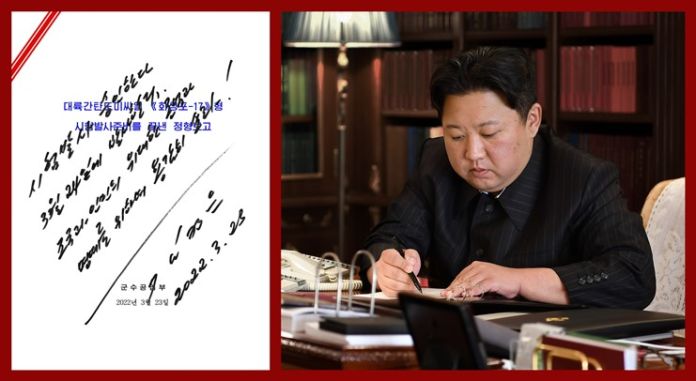
North Korea has broken its moratorium on ICBM launches, test launching its latest intercontinental missile in the most advanced way possible based on a written order from North Korean leader Kim Jong Un himself. Some experts believe Pyongyang could ride the momentum and conduct the country’s seventh nuclear test sometime soon.
According to South Korea’s Joint Chiefs of Staff, the North Korean launch vehicle reached an altitude of 6,200 kilometers after being fired at a high angle, flying 1,080 kilometers to a point in the East Sea. This means if North Korea fired the missile at a normal angle of 30 to 45 degrees, it could threaten Washington DC, New York or other targets on the US mainland.
North Korea’s decision to break its moratorium on nuclear tests and ICBM launches at this time may be aimed at taking the initiative in inter-Korean relations ahead of the launch of the incoming South Korean administration, and to turn negotiations with the US into “nuclear disarmament talks.”
In a telephone conversation with Daily NK on Friday, Asan Institute for Policy Studies Associate Research Fellow Yang Uk said North Korea had been waiting for the time it could complete its ICBM technology and flip negotiations into nuclear disarmament talks. He said North Korea has already calculated that it can gain nothing more from denuclearization or its moratorium.
Yang said North Korea has been sending continuous signals to this effect since the change in the US administration in January of last year. However, because North Korea was placed on the back burner of US foreign policy priorities, Pyongyang judged that now was the right time to make its move, with a new administration set to take power in South Korea.
Hong Min, the head of the North Korean Research Division at the Korea Institute for National Unification (KINU), said the missile test aimed to influence the strategic thinking of South Korea and the US before the two countries solidify cooperation over the North Korean nuclear issue. He said Pyongyang was using the policy vacuum that will exist until the new South Korean administration can formulate its North Korea policy.
The problem is that North Korea is trying to launch “nuclear disarmament” talks as a full nuclear power, rather than simple denuclearization negotiations.
Park Won Gon, a professor of North Korean studies at Seoul’s Ewha University, told Daily NK that North Korea is already rushing towards its unitary goal of becoming a nuclear power. He said Pyongyang is trying to bolster its negotiating power by turning talks with the US into nuclear disarmament talks after advancing its development of strategic weapons. Basically, the last four years of talks and measures aimed to entice North Korea into denuclearizing have gone up in smoke.
Not only that, but North Korean authorities may push forward with a seventh nuclear test to achieve substantive progress in miniaturizing nuclear warheads.
The Asan Institute’s Yang said now that North Korea has made an ICBM that can threaten the US mainland, Pyongyang’s task going forward is not develop smaller nuclear warheads it can place on the KN-23 (the “North Korean Iskander”), the KN-24 (the “North Korean ATACMS”) or a Hypersonic Glide Vehicle.
He said North Korea launched its Hwasong-12 missile just four days after the inauguration of the Moon Jae-in administration in 2017, too. Yang added that at the earliest, Pyongyang could conduct a seventh nuclear test sometime in the first seven days of the Yoon Suk-yeol administration.
KINU’s Hong also said he could not discount the possibility of North Korea conducting a nuclear test in the second half of the year, after watching the attitudes of South Korea and the US. He said North Korea has an emerging need to conduct nuclear tests to miniaturize warheads for tactical nuclear weapons.
Essentially, experts Daily NK interviewed agreed that North Korea will conduct new nuclear tests to miniaturize warheads, although there are differences in the predictions they have about when these tests will take place.
However, North Korea may remain open to talks or negotiations even if the country raises tensions with a dramatic provocation.
In fact, even after the UN Security Council placed tough sanctions on North Korea in 2017, North Korean leader Kim Jong Un met with South Korean President Moon Jae-in in Panmunjom on Apr. 27 of the following year. Kim also held his first summit with US President Donald Trump on June 12.
Ewha University’s Park said North Korea left open the door to dialogue in accordance with its needs, even while responding to hard line measures with hard line measures of its own. He said if North Korea believes it has the “independent defensive strength” to give it an edge in negotiations, it is essentially ready to talk.
However, some experts worry that North Korea could intentionally stall negotiations, believing the COVID-19 pandemic has diminished what the country could win in talks.
Park said North Korea will ultimately demand the lifting of sanctions, but with COVID-19 raging, the country will not be able to engage in normal economic activity even if sanctions are lifted.
“Considering the situation from a holistic standpoint, Pyongyang could accelerate its development of strategic weapons for the time being,” he added.

















